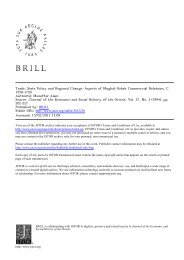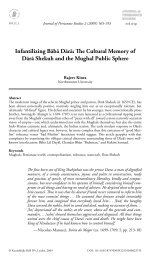The Mughals, the Sufi Shaikhs and the Formation of the Akbari ...
The Mughals, the Sufi Shaikhs and the Formation of the Akbari ...
The Mughals, the Sufi Shaikhs and the Formation of the Akbari ...
You also want an ePaper? Increase the reach of your titles
YUMPU automatically turns print PDFs into web optimized ePapers that Google loves.
FORMATION OF THE AKBARI DISPENSATION 169<br />
interesting to note <strong>the</strong> following passage, which explains why he did<br />
as above:<br />
Someone reported in <strong>the</strong> presence <strong>of</strong> Hazrat-i Ishan (Baqi-Billah) that a<br />
certain person [<strong>the</strong> author hints at Nizam al-Din Thanesari, a leading Chishti<br />
shaikh, but does not mention his name] says that Hazrat-i Ishan emancipates<br />
seekers from having faith in former pirs <strong>and</strong> insists that <strong>the</strong>y receive teaching<br />
only from him. He (Baqi-Billah) said this was not <strong>the</strong> case. ‘But if I find some<br />
<strong>of</strong> <strong>the</strong> seekers in two minds, I advise <strong>the</strong>m to concentrate on one path (...)’.<br />
<strong>The</strong>n he said that <strong>the</strong> faith that he had in <strong>the</strong> shaikhs <strong>of</strong> <strong>the</strong> o<strong>the</strong>r silsilas is<br />
hardly found among <strong>the</strong>m. In particular, <strong>the</strong> people <strong>of</strong> India’s beliefs about<br />
<strong>the</strong>ir pirs verge on idolatory. 97<br />
But while for him, <strong>and</strong> for that matter for any o<strong>the</strong>r shaikh <strong>of</strong> his<br />
order, it was legitimate to allure <strong>the</strong> followers <strong>of</strong> o<strong>the</strong>r silsilas, hedid<br />
not allow <strong>the</strong> murid <strong>of</strong> a Naqshb<strong>and</strong>i to seek guidance from any o<strong>the</strong>r<br />
pir in India. Elaborating on <strong>the</strong> relationship between <strong>the</strong> seeker <strong>and</strong><br />
<strong>the</strong> preceptor, he wrote to his khalifa, Shaikh Taj al-Din:<br />
And similarly in <strong>the</strong> moral conduct (adab) <strong>of</strong> <strong>the</strong> Naqshb<strong>and</strong>i Ahrari path you<br />
should be firm like a mountain, never mixing it with <strong>the</strong> path <strong>of</strong> <strong>the</strong> o<strong>the</strong>r<br />
(...).Whoeverisyourmurid is your murid only. Train <strong>and</strong> teach him according<br />
to Naqshb<strong>and</strong>i path only (...). Of what interest is <strong>the</strong> person who receives<br />
<strong>the</strong> light from you <strong>and</strong> <strong>the</strong>n attends upon a Shattari [shaikh] 98<br />
With reference to <strong>the</strong> discourse on tauhid <strong>and</strong> wujud, we are aware<br />
that <strong>the</strong> Chishtis in India followed Ibn al-’Arabi (d. 1240) <strong>and</strong><br />
maintained that <strong>the</strong> position <strong>of</strong> ‘Ala al-Daula Simnani (d. 1336), who<br />
contested Ibn al-’Arabi’s st<strong>and</strong> <strong>and</strong> propounded a contrary view, was<br />
not correct. Baqi-Billah for his part took a different st<strong>and</strong>. He proposed<br />
that both Ibn al-’Arabi <strong>and</strong> Simnani were right. Still, while he tried<br />
to reconcile <strong>the</strong> two views <strong>and</strong> suggested that <strong>the</strong> difference between<br />
<strong>the</strong>m was only in words ra<strong>the</strong>r than in deeper substance, he argued<br />
that Simnani was closer to <strong>the</strong> truth:<br />
His (Simnani’s) shuhud (perception) is <strong>the</strong> most perfect shuhud. <strong>The</strong> difference<br />
is that a group <strong>of</strong> <strong>the</strong> ‘ulama [read: Indian <strong>Sufi</strong>s] believe that things do not exist<br />
objectively <strong>and</strong> that <strong>the</strong>ir external appearance is only like <strong>the</strong> appearance <strong>of</strong><br />
<strong>the</strong> reflections in a mirror. In sum, <strong>the</strong>y recognize only one existence. <strong>The</strong><br />
shaikh [Simnani] with his power <strong>of</strong> perception (shuhud) <strong>and</strong> its pre-eminence<br />
recognized <strong>the</strong> objective existence <strong>of</strong> things too”. 99<br />
97 Kulliyat-i Baqi-Billah, Section Malfuzat, p.35.<br />
98 Kulliyat-i Baqi-Billah, Section Ruq’at, p.77.<br />
99 Kulliyat-i Baqi-Billah, Section Ruq’at, p.123.<br />
http://journals.cambridge.org Downloaded: 15 Feb 2011 IP address: 129.174.97.34






